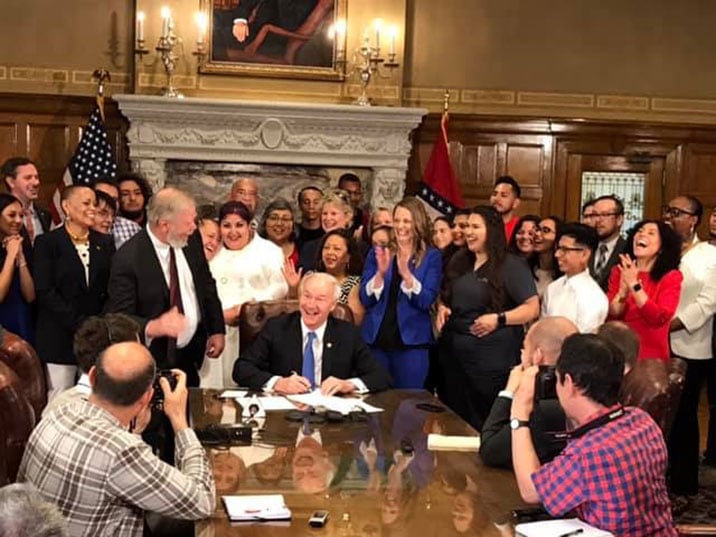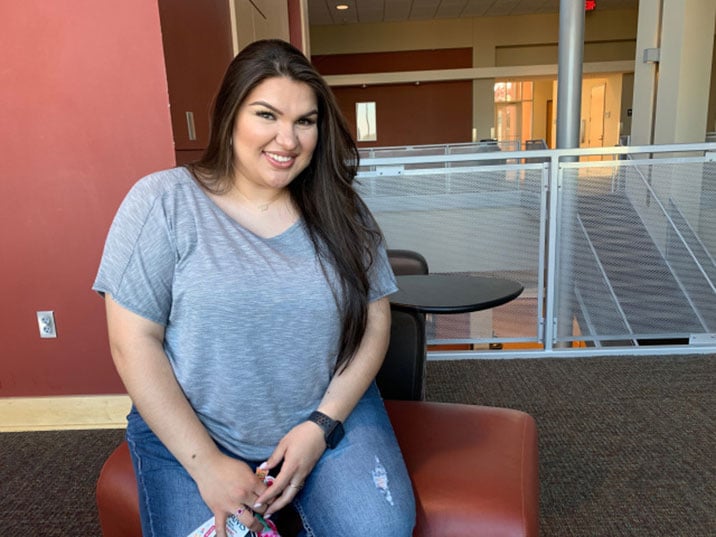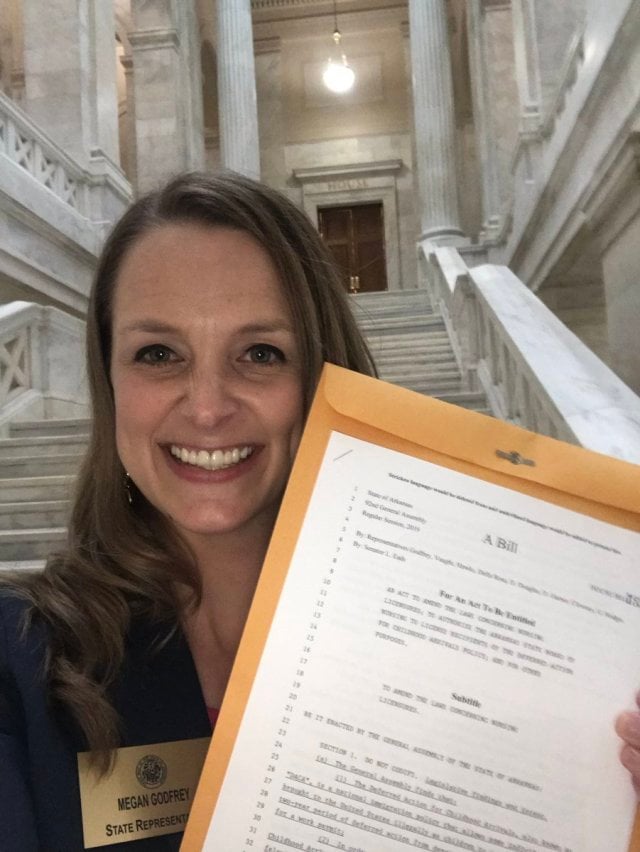
Supporters erupted in celebration as Gov. Asa Hutchinson signed House Bill 1552 into law on April 4, 2019. The bill went to the governor’s desk after passing the House and Senate unanimously.
Photo courtesy of Rosa Ruvalcaba Serna
Bored by her international business classes, Ari Valencia branched out and took a nursing class at Northwest Arkansas Community College in Fayetteville in the spring of 2018. When she landed a job as a certified nursing assistant at Washington Regional Medical Center a few months later, she realized that she was meant to be a nurse.
“I loved the patient-care setting,” Valencia said. “The bonds and relationships that nurses form with patients is a beautiful thing, and I was just absolutely drawn to it.”
Valencia dreamt of helping ease the physical and emotional pain of hospital patients in her home state. Happy to leave business classes in the dust, she switched to a nursing major and expected to never look back.
That was, until she found out that her immigration status prohibited her from getting a nursing license in the state of Arkansas.
Valencia is one of roughly 5,000 individuals in the Natural State who have been approved for the federal Deferred Action for Childhood Arrivals (DACA) program since its 2012 inception under the Obama administration.
According to the Immigrant Legal Resource Center, DACA is an immigration option for undocumented individuals who immigrated to the U.S. before the age of 16 and have met education requirements. DACA recipients are protected from deportation, but many states do not allow them to sit for professional licensure.
When Megan Godfrey of Springdale ran for Arkansas state representative in 2018, she wanted her campaign’s legislative solutions to reflect the needs of her hometown, which is 36.5 percent Latino. As soon as Godfrey won District 89, which includes portions of Washington County, she drew up a bill to tackle the problem of DACA nursing licensure.
“I knew that it would be challenging as a freshman and as a Democrat where 76 of my colleagues are Republican,” Godfrey said, “but it’s a great bill with a great solution, and I thought I could do it. And regardless, I wanted to try.”

Rosa Ruvalcaba Serna has gravitated toward medicine since watching St. Jude Children’s Research Hospital commercials as a child. “I’ve always had a compassionate heart,” Ruvalcaba Serna said. “Watching those commercials struck something in me. I wanted to be able to help people.”
Photo by Emily Franks
Beyond enhancing opportunity for DACA recipients, House Bill 1552 to improve nursing licensure laws gained broad bipartisan support because it was a concrete solution to a real problem in Arkansas, Godfrey said. The state is suffering from a severe nursing shortage, as 73 of 75 counties are considered medically underserved.
“We can’t get enough health-care professionals, so we’re desperate for nurses in our state,” Godfrey said. “And here we have qualified nurses who are ready to go to work in Arkansas and contribute to our community’s economy and health; they just need a license to do it. This bill presented a win-win.”
Godfrey said she first got the idea for the bill when Little Rock native Rosa Ruvalcaba Serna got national media attention for the issue of nursing licenses for DACA.
Ruvalcaba Serna, who emigrated from Mexico when she was 6 years old, grew up knowing that her immigration status came with restrictions, but she never knew what that meant for her adult life, she said. Part of her wanted to become a doctor; part of her doubted college would be an option.
Encouraged to apply for college by her high school’s college counselors, Ruvalcaba Serna was accepted to the University of Central Arkansas, but she found that all of the university’s scholarships required either U.S. citizenship or residency, neither of which she had. Unable to afford it, she gave up on her dream of higher education.
“To me, having a degree meant everything,” Ruvalcaba Serna said. “My mom had sacrificed everything for my education. Getting a degree was the least I could do; I just wanted to make her proud.”
The summer after Ruvalcaba Serna graduated from high school in 2012, Obama passed the executive order of DACA. Ruvalcaba Serna’s application for DACA was approved, and with a newfound hope, she enrolled in Pulaski Technical College.
“I was working three jobs and going to school full time,” Ruvalcaba Serna said. “I would leave my house before the sun came up and would get home way after the sun had set. It was exhausting, but that was just my reality.”
Toward the end of college, Ruvalcaba Serna applied and was accepted to the Bachelor of Science in Nursing program at the University of Arkansas for Medical Sciences. A few hours after her white coat ceremony in the fall of 2017, she came across a Facebook post about DACA students being denied licensure.
The director of UAMS Nursing told Ruvalcaba Serna that she could continue in the program, but he warned her that she might have to move across the country to become a licensed nurse in one of the three states that allowed it – California, Washington and New York.

Freshman Rep. Megan Godfrey (D-Springdale) poses with her first bill, posted on her Twitter account. “I filed my first House bill! HB1552 will allow DACA recipients to be licensed as Arkansas nurses,” Godfrey said on Twitter.
Photo courtesy of Godfrey
“He offered me a full refund of tuition,” Ruvalcaba Serna said, “but I knew that God wouldn’t have brought me this far if this wasn’t where I was supposed to be. So I chose to continue in the program.”
After bringing awareness to the problem at an Arkansas Nursing Students’ Association Convention, Ruvalcaba Serna was featured in an article for Nurse.org in November 2018. The post’s shares and support brought national attention to the licensure restrictions.
Having become the story behind the bill, Ruvalcaba Serna partnered with Godfrey to testify for HB1552. Godfrey knew Rosa’s story would be compelling for the committee members because it made an abstract issue personal, she said.
“Rosa is exactly the kind of nurse we want and need in Arkansas,” Godfrey said. “She’s resilient, hard-working and committed to caring for others. She’s exactly what we want, and I think she communicated the humanity of the issue. We’re not talking about immigration; we’re talking about Rosa and her nursing career.”
Ruvalcaba Serna and Valencia testified in front of the House and Senate in March 2018 for the bill, which passed unanimously in both committees. The nursing students who testified carried the momentum to the finish line, Godfrey said.
“People realized that these are real Arkansans and these are the type of people we want taking care of our mothers when they’re sick and delivering our babies and being at the hospital with us. These are who we want as nurses. It was so special,” Godfrey said.
Because of HB1552, Valencia no longer has to choose between doing international business in her home state and following her dream in another.
“Arkansas is all I know; it holds a special place in my heart,” Valencia said. “There is a lot that can be done in our community here, and I want to be able to impact our state by giving back in a meaningful way.”
Valencia is working at Arkansas Children’s, where she will now be able to move up from a CNA to a nurse one day.
“This success of this bill has given me my future, and it’s given me the career I’ve always wanted,” Valencia said. “It makes me so hopeful for the future, both for what I can do and for what others can overcome.”
Beyond passing the law in Arkansas, Ruvalcaba Serna is proud to have raised awareness about this national issue and hopes that other states will consider reexamining their licensure laws, she said.
Back in November 2018, a friend and colleague of Ruvalcaba Serna raised $3,000 on GoFundMe for the aspiring nurse’s cross-country move to California.
Ruvalcaba Serna is saving the money until January, when she will use it to pay to sit for nursing licensure in Arkansas.

